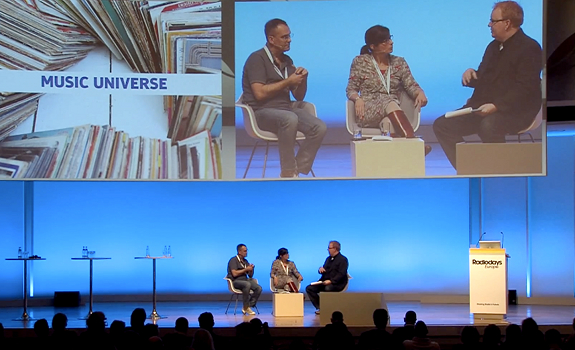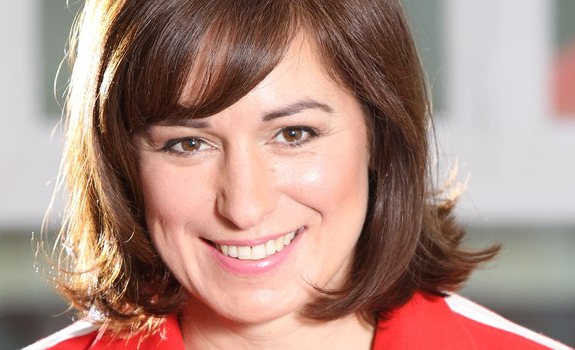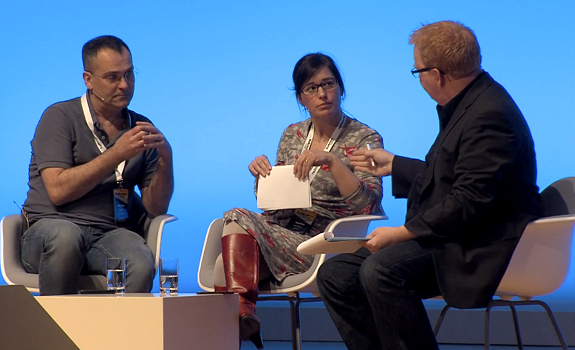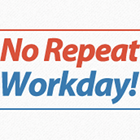Could a narrow focused playlist as your music scheduling strategy not only improve your radio station’s cume, but also your average hour reach and radio market share?
The answer was given in a music programming session at Radiodays Europe 2013. From deciding about playlist additions to dealing with record companies; from implementing your music research to marketing your station format – Nik Goodman interviewed music directors from the UK and Germany about their best practices for music scheduling.
“Get people to stay with you
for one video to the next”

Capital FM music director Mark Findlay (left), here on stage with Tanja Ötvös and session host Nik Goodman, also programs brand extension Capital TV – which requires separate music selection criteria (photo: ALEXberlinTV)
Upscale successful radio concepts
“It’s a very tight focused radio station”, says Mark Findlay about Capital FM, of which he is the music director for over a decade. The UK’s Number 1 Hit Music Station has a weekly reach of 7 million people and is targeting a 15-34 year-old, slightly female-skewed audience. In January 2011, owner Global Radio rolled out the London-based Capital brand all over the UK, sacrificing heritage brands such as Galaxy. Apart from local morning and drive time shows they run network programming, broadcast from the company’s headquarters at Leicester Square. Concentrating brands and cutting overhead is necessary to survive, as Global Radio’s Stephen Miron recently said about the state of commercial radio in the UK.
 Anticipate on music cycle
Anticipate on music cycle
Findlay knows the challenges of programming a Contemporary Hit Radio station for a young audience that is difficult to please. “It’s an ever-changing focus”, he says about the dynamic music cycle that influences the radio station’s playlist and core audience preference. Capital FM is pure CHR and therefore hardly plays anything older than 2 years. The majority of songs is from the last 12 months, with a major focus on current hits.
Program radio & TV differently
“The fun and exciting thing now is that there’s music coming at you from everywhere”, Mark Findlay says about the large choice of new songs they have. Their playlist usually includes about 50 currents, which are determined in the weekly music meeting where he sits down with CEO Ashley Tabor, Group PD Richard Park and Capital FM PD Robert D’Ovidio. Besides selecting songs for the radio station, they also do that for Capital TV, where criteria a slightly different. (Music) television viewers have a short attention span, so it’s more a game of minutes. “If you can get people to stay with you for one video to the next, you’re doing really well. Certain things that we might build slower in radio, we can put on TV [sooner and more often] because you’re also seeing the visual of it.”
“If we like it, we play it”

Radio Hamburg head of music Tanja Ötvös explains that they not necessarily follow the record company’s release agenda, but do independent research to find suitable new music for the current playlist (photo: Radio Hamburg)
Daypart older classic hits
Glory Days was the first song on Radio Hamburg when it launched on New Year’s Eve 1986. Bruce Springsteen delivered a self-fulfilling prophecy; the station is market leader among 28 other programs in Hamburg, and many advertisers are willing to pay the almost 900 Euros for a 30-second commercial. The 20-40 year-old target audience apparently loves Rihanna and Michael Jackson – as both of them are represented by 12 songs in the station’s music database of around 500 titles in rotation. Although its Pop-based Hot AC format is very current, recurrent and 2000s driven, the station also plays one 90s song (and, between 9 AM and 3 PM, one 80s classic) per hour.
 Introduce playlist additions randomly
Introduce playlist additions randomly
Interestingly enough, Radio Hamburg doesn’t have a regular playlist meeting. Instead, all music team members log on to the Music Promotion Network and check out the latest releases individually. “If I like one or think: this will work well for Radio Hamburg, I’ll ask the others”, head of music Tanja Ötvös explains. They also add new songs fluently; there is no fixed weekday when a new title is added to the music rotation.
Find new music everywhere
While many stations have a close group of music decision makers, at Radio Hamburg also colleagues outside the music department are welcome to give their input. “They send me a link from YouTube or anything else. We also listen to this”, Ötvös says. “If we like it, and think this could work at our radio station, we play it.” Just like more and more stations, they don’t wait for record labels to bring new music to their attention; they do their own research by reading Q Magazine or Billboard to find out what goes on in the UK and US, as around 85% of the music on the station is international. This is how Radio Hamburg and Capital FM sounded in the spring of 2013:
[audio:http://www.radioiloveit.com/wp-content/uploads/music-scheduling-session-radiodays-europe-2013-01.mp3|titles=Music montage of Radio Hamburg and Capital FM]
“I always do what’s called: the lift test”

Mark Findlay thinks that music formats should be so recognizable that they take a listener only one song, or a maximum of two songs, to identify the name of the station based on the music played (photo: ALEXberlinTV)
Create ‘win-win’ label relations
“It needs to be a two-way, open, honest communication”, Capital FM’s head of music Mark Findlay says about the special kind of relationship between music directors and record companies. Even if some record reps promote their music quite aggressively, he tends to appreciate the role of the music industry as a whole. “If you go into any major record label in the UK, people are talking about artist development; nurturing talent.”
 Respect record company people
Respect record company people
A befriended independent plugger once described the record industry to him as beging “the most forgiving financial institution”, and Findlay basically agrees. “They will invest all this money in your career. If it goes horribly wrong, they won’t come and take your house off you.” Listening to Ötvös and Findlay, it seems that record labels are pretty creative in trying to persuade music schedulers to put their songs on the air…
[audio:http://www.radioiloveit.com/wp-content/uploads/music-scheduling-session-radiodays-europe-2013-02.mp3|titles=Tanja Ötvös and Mark Findlay about how record labels promote music]
Establish recognizable brand (portfolio)
Both music directors feel that the majority of label representatives understands their brand, so they hardly ever pitch songs that are not right for the station. Mark Findlay finds himself very privileged to work at Global Radio [Wikipedia], where they have very focused; very recognizable formats and brands. “I always do what’s called: the lift test”, is his analogy to an elevator pitch. “If a record comes on, you’ll be about 90% certain which station you’re listening to; second record: you’ll absolutely know it.”
“You can never know too much
about your audience”

A deep understanding of the target audience and their musical preferences should be the groundwork for each and every playlist decision that a music director makes on behalf of the radio station (photo: unknown)
Test currents & library songs
Radio Hamburg is testing both currents (through bi-weekly call-outs) and their back catalogue (twice a year, through auditorium music testing). For Tanja Ötvös, research is “an important tool”, but gut feeling is essential as well. If a record would test well among her stations P1 audience [so the preference 1 or core listeners] but she would be really convinced that it doesn’t fit the format, she wouldn’t play it. Capital FM’s Mark Findlay stresses the essence of really knowing the listener and his preferences in order to make the right decisions. “You can never know too much about your audience. Music testing, which we do on a weekly basis, is a tool to guide you.” He also explains what makes a great hit record, and illustrates that music directors should grant new songs enough time to become familiar and popular:
[audio:http://www.radioiloveit.com/wp-content/uploads/music-scheduling-session-radiodays-europe-2013-03.mp3|titles=Mark Findlay about the importance of giving great songs a break]
 Be careful with hypes
Be careful with hypes
What about hype songs, such as Gangnam Style or Harlem Shake that have become incredibly popular in 2013 through YouTube? Capital FM plays them “sparingly”, and Radio Hamburg ignores them completely. The main reasons are that without a video, songs like these prove to be far less effective. In addition, they have an expiration date that is usually not far down the road, as Findlay explains:
[audio:http://www.radioiloveit.com/wp-content/uploads/music-scheduling-session-radiodays-europe-2013-05.mp3|titles=Mark Findlay and Tanja Ötvös about how they deal with hype songs]
Minimal burn? Keep playing!
When a song shows an increasing burn week after week, where would Radio Hamburg draw the line and take it out of the rotation? For this kind of decisions, music programmer Tanja Ötvös relies on the research: “If a song still tests good, I leave it on the playlist”. In her experience, most songs start to burn around 600 plays. But there are exceptions, such as As by George Michael & Mary J. Blige, which stayed on their playlist for many weeks in a row, as call-outs continuously showed that listeners still loved it.
“It’s all about the music image”

Head of music Mark Findlay recalls that Capital FM was the first UK radio station to feature internationally famous artists in their TV campagins, is aimed at positioning them as a music brand (photo: ALEXberlinTV)
Choose your positioning focus
While some stations are mainly marketed among their radio personalities, and they do have John Ment as a popular morning show host, for Radio Hamburg the music image still is the most important thing to communicate in on-air and off-air promotions. “We are claiming our variety, we play hooks in short trailers to show our music range, and we have a No Repeat [Workday] between 9 and 6.” While especially the latter works well for them, Ötvös notes that “it’s very difficult to plan this”. While during the morning show only the very best testing songs are scheduled, she feels that it’s a challenge to find enough good songs to play between 9 AM and 6 PM [without violating artist separations and dayparting restrictions].
 Experiment with tightening rotations
Experiment with tightening rotations
No Repeat would probably not work for Top 40 formatted Capital FM, where rotations are much tighter. In a battle with two competing CHRs, music director Mark Findlay decided to play very young music and use a really tight rotation. Interestingly enough, this narrow focus not only improved the station’s cume, but also the average hour reach and market share. An interesting tactic is to margin your playlist every quarter and see what happens:
[audio:http://www.radioiloveit.com/wp-content/uploads/music-scheduling-session-radiodays-europe-2013-04.mp3|titles=Mark Findlay and Nik Goodman about tight rotations as programming tactic]
Run artist testimonial promos
“It’s pretty much all about the music image”, Findlay says about Capital FM’s radio programming strategy. The nationwide introduction of the brand in January 2011 was supported by TV commercials around artist testimonials – from British acts like Jessie J and Ed Sheeran, to international superstars such as Pink and Rihanna, where they let the celebrities talk about radio, music and the station. “That gave us a really powerful cut-through in the marketplace”, the music director recalls. “It hadn’t been done in the UK before.” Apart from a network version, which features only the artists, they also run local versions of the spots that integrate the local morning show teams. [95-106 Capital FM UK TV Advert 2013]
“It has to work for everyone”

The Summertime Ball with a superstar line-up is Capital FM’s annual major music event (photo: Global Radio)
Include helpful service bits
In terms of music events, Radio Hamburg has only one left – a special chart show they do during the Easter weekend. It starts on Saturday morning on the radio, and ends on the following Monday with a big concert. The station doesn’t present other music events as a media partner anymore as they don’t feel like it adds a lot of value. Instead, they have a concert review feature called Konzertcheck (Concert Check). When an interesting artist or band starts a (new) tour in Europe, Tanja Ötvös reviews their first concert on the air and online. “It’s fun and a good service for our listeners.”
 Organize annual benchmark events
Organize annual benchmark events
For Capital FM, live events are important. The annual Summertime Ball at London’s Wembley Stadium attracts 80.000 visitors; during Christmas the two Jingle Bell Balls in the O2 Arena entertain up to 17.000 people. Summertime Ball 2013 – including Robbie Williams, Taylor Swift, Jessie J and Will.i.am – is hosted by Justin Timberlake. “It has to work for everyone”, project manager Mark Findlay says about how they collaborate with record companies:
[audio:http://www.radioiloveit.com/wp-content/uploads/music-scheduling-session-radiodays-europe-2013-06.mp3|titles=Mark Findlay about keeping good relations with record labels]
Eliminate your personal taste
The best heads of music are often the ones that can set their personal taste aside, and completely focus on serving the needs of the station’s target audience instead. But of course, every great MD also has a great passion for music! Nik Goodman’s final question for the music director panel is a fun but tough one: what’s their favorite record of all time? “All songs from Crowded House”, Radio Hamburg’s Tanja Ötvös laughs. Her colleague Mark Findlay of Capital FM has a surprising answer for a Top 40 station’s head of music: “One of the finest songs ever written… Alfie by Burt Bacharach.”





Ah, I see your point now. Makes sense, indeed.
Thanks for the clarification, interesting subject!
Best,
Thomas
Hello Thomas!
I would not trust in loyalty that much :-).
Actually I just tried to illuminate a strategy on how to win 15-49 ‘statistically’ while the format is 15-25 targeted.
Just for a quick demo, imagine this situation [certainly this will not pass hardcore statistical math but good for an example]: Station is No. 2 with 10% in 15-49 and this result can be broken down to 20% in 15-29 and 2% in 30-49. All in all this is possible since you won 15-25 with 27%.
This is why we hear Audi commercials on a youth-oriented Top 40 station…
Happy programming!
Antal
Hi Antal,
Thanks for your valuable notes and additional insights!
Haha, yes!
Is that because young people stay loyal to their favorite station, thus keep tuning in to that radio station when they’re older?
Yes, that’s what we hear often, indeed. Unless you’re a CHR – where listeners expect to hear a lot of current hits and also a bit of new music – it’s a dilemma, isn’t it? This probably explains why so many AC’s only play best testers, also in terms of their currents. They wait until CHR has made these new songs familiar enough.
On the other side: many AC listeners grew up with Top 40 radio and still want to be (or feel) young and connected to what happens today. So I believe that if you play the RIGHT new music for your audience, these new songs can actually HELP you (create the image of a modern brand). The art is the ability of spotting the best new songs for your format and audience.
Great point. It’s important to ‘sell’ new music well in a PowerIntro – preferably include a hook in the beginning, so people know there’s something good coming up if they ‘sit out’ the intro and first verse of this (unfamiliar but interesting) song. But I’m wondering why so many stations only brand current hits.
Especially in AC, which is obviously driven by familiar music – and rather uses tested recurrents than less familiar chart hits, PowerIntros can be a great tool to brand these recent songs that people know and love with the name of your radio station.
Hello,
Owning a song is a different issue. First of all it needs ‘competitors’ who ‘allow’ this to you. In some markets (e.g. in the US) station formats are very niche, so a station can be recognized by songs – even by the style of songs, if they are lucky.
In Europe (and Asia), ‘We Play Anything’ AC stations with a ‘target audience’ of 15-49 are quite common. Historically they did not need to specialize, so they give literally the ‘same’ music content to the listeners. New entrants rarely ‘take risk’ with being different so they end up being just slightly different :-) This approach doesn’t even need tight rotations – so to make a station recognized by the songs or styles it plays can be difficult, but works.
One good method is to ‘stamp’ these songs with PowerIntros. It needs creative and some production background, but it’s worth the efforts I dare say. One can simply outsource this. In our practice we count 5-10 PI songs monthly on average at AC stations so this would enough for you to start calculating with. It works even in competitive markets of course.
On the other hand be advised: according to our research, new songs seem like the greatest switch-away factor for years, so be careful with selecting the right songs for PI [what about your recurrents?].
BTW, 15-49 is not a target; this is a family reunion… Yes, we all know that extraordinary good results in 15-25 may lead us to win 15-29 and a good position in 15-39; maybe in 15-49. But at the very end this remains a youth-oriented station, so from an effective sales point of view that needs to be considered. Target what you want to win and harvest on sales.
Kind regards,
Antal